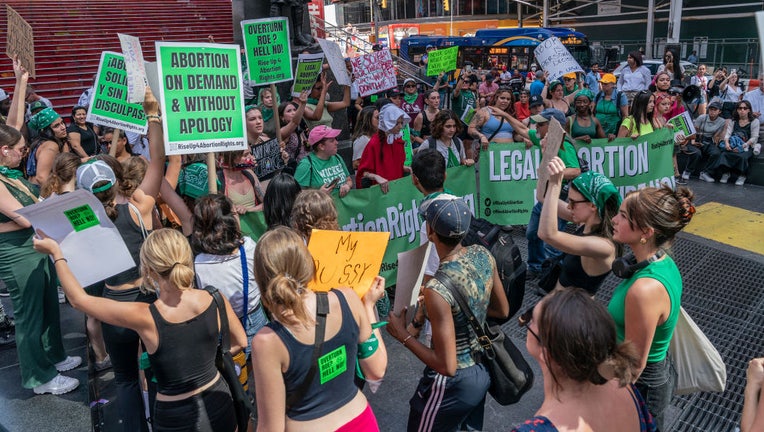At least 66 US clinics have stopped abortions since Supreme Court ruling, institute says

FILE-More than two hundred activists gathered on Union Square, walk to Times Square in New York to rally to voice their displeasure with the Supreme Court decision on abortion. (Lev Radin/Pacific Press/LightRocket via Getty Images)
At least 66 clinics in 15 states have stopped providing abortions since the U.S. Supreme Court overturned Roe v. Wade, according to an analysis released Thursday.
The number of clinics providing abortions in the 15 states dropped from 79 before the June 24 decision to 13 as of Oct. 2, according to the Guttmacher Institute, a research group that supports abortion rights.
All 13 of the remaining clinics are in Georgia. The other states have no providers offering abortions, though some of their clinics are offering care other than abortions.
RELATED: South Carolina legislators unlikely to make abortion laws stricter
Nationally, there were more than 800 abortion clinics in 2020, the institute said.
"Much more research will need to be conducted to grasp the full extent of the chaos, confusion and harm that the U.S. Supreme Court has unleashed on people needing abortions, but the picture that is starting to emerge should alarm anyone who supports reproductive freedom and the right to bodily autonomy," said Rachel Jones, a Guttmacher researcher.
The new report does not include data on hospitals and physician offices that provided abortion and stopped them after the court ruling, but Jones noted that clinics provide most U.S. abortions, including procedures and dispensing abortion medication. Recent Guttmacher data show just over half of U.S. abortions are done with medication.
RELATED: Teen intrigue in long-lasting birth control options rises after Roe v. Wade decision
States without abortion providers are concentrated in the South. In some of those places, many women seeking abortions would need to travel so far that the journey will be impossible, Jones said.
Dr. Jeanne Corwin, who provides abortions in Indiana and Ohio, said clinic closures "will result in immeasurable harm to women’s physical health, mental health and financial health.’’
In several states, access is under threat because bans were put on hold only temporarily by court injunctions. These include Indiana, Ohio and South Carolina, the analysis found.
RELATED: State by state: Abortion laws across the U.S.
"It is precarious from a medical standpoint and certainly from a business standpoint,’’ said Dr. Katie McHugh, an OB-GYN who provides abortions in Indiana. "It’s difficult to keep the doors open and the lights on when you don’t know if you’re going to be a felon tomorrow."
The Associated Press Health and Science Department receives support from the Howard Hughes Medical Institute’s Department of Science Education. The AP is solely responsible for all content.

